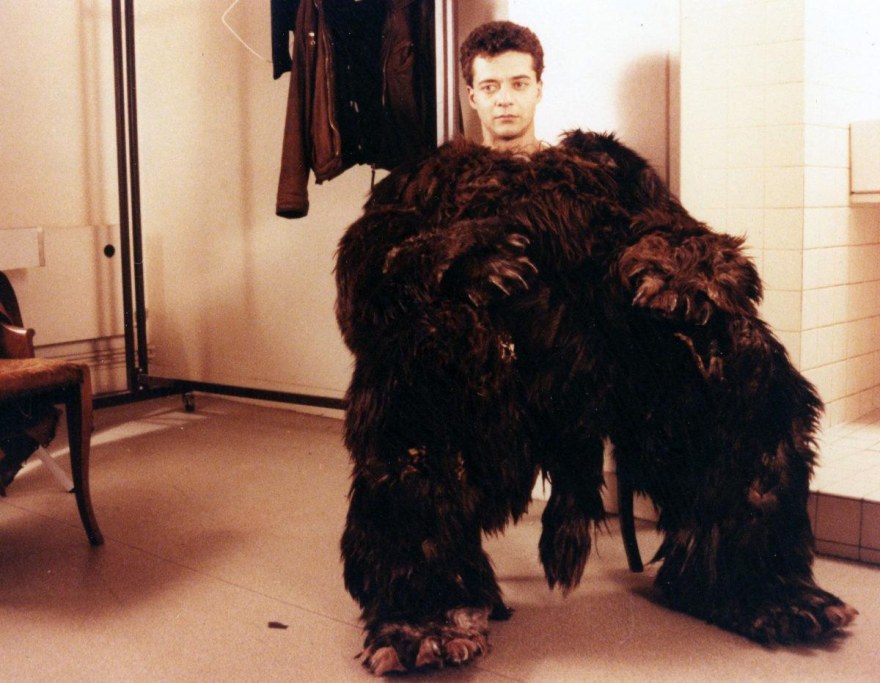Face Forward
Bête de scène by Bernard Nissile (France – 1994)
There are any number of directors who have cut their teeth in the world of short films.
But it’s the actors who stand, belting, on the front lines of the seventh art, fearless and often unknown soldiers marching to the orders of script and director. From hesitant beginnings to thunderous returns, from vibrant homages to late bloomers, these “casting survivors”, are now familiar faces, some of them even giants of cinema.
There are those we glimpsed once at a screening and have never seen again, and those we enjoy meeting here again every year, famous, dusty mugs, big mouths, ugly mugs, heart throbs, every type of face that you’d find in a short film during the Festival’s long winter evenings. Over time, they’ve all become friendly faces, cinematic benchmarks, our neighbors in darkened theaters.
Many of them have seared our memories over these past forty years: Karin Viard, for example, smothered by the prim goodwill of her attentive parents (Une visite, which tied for the Special Jury Prize in 1996), or Eric Caravaca in a deeply moving, confessional face shot (Dedans), or again Bruno Lochet’s deafeningly silent, amourous chase of Amira Casar (in Départ immédiat, which also shared 1996’s Special Jury Prize), the union demands that the worker François Cluzet makes of his tough boss – one hundred feet off the ground (in Xavier Giannoli’s Dialogue au sommet) or the sad smile of the unnervingly fragile giant, Serge Riaboukine, in La leçon de guitare.
There is also the face of a new generation of actors who are now a given for Festival-goers, actors who have made countless appearances, both fleeting and foundational but always remarkable, familiar faces whose names it is about time we learned. Who can now forget Franc Bruneau (in People Are Strange), Philippe Rebbot (in ¿Donde está Kim Basinger?, which won the Grand Prix and Prix CANAL+ in the national competition in 2010, but also in Panique au sénat and Waterfountain, which bith are in the National Competition). Let’s not forget Vincent Macaigne whose prolific work has garnered much attention. His film Ce qu’il restera de nous, which won the Grand Prix and Prix de the Press prize in the National Competition in 2013, got him noticed as a filmmaker, while he worked as an actor in Vincent Mariette’s Les lézards. And what about Benoît Forgeard and Estéban, those eternal, magnificent losers who nevertheless always surprise and enchant us.
And let us now turn our attention to the stalwart figure of those women called up to arms. Léa Drucker, for example, as an unforgettable, hunted mother of unshakable courage in Xavier Legrand’s immense film Avant que de tout perdre. Legrand’s feature film Jusqu’à la garde is the prequel to the short and will hit theaters during the Festival on 7 February 2018. Or how about Laëtitia Spigarelli, who will also be in Roméo and Pourquoi j’ai écrit la Bible which are in the National Competition. In Décroche, she plays a young woman secluded in an apartment whose only link to the outside world are the daily conversations she has with strangers who would gladly hang up on her as she calls them from the phone booth outside her flat. Or Vimala Pons, both endearing and awkward, determined to slake her thirst for vengeance (J’aurais pu être une pute); or Mathilde Bisson as an unpredictable, stone-faced, goth hitchhiker (People are Strange); or Maïwenn in her first short film, which already hints at her particular autobiographic flavor (I’m an actrice, 2004).
It is inevitable too that we would have to include films about actors. On the one hand there is Kacey Mottet Klein, naissance d’un acteur, a documentary that follows him from his first castings to his nomination for a César award for Best Young Actor in 2012. Under the benevolent eye of his protector and director, Ursual Meier, the child turned young man and accomplished actor tells us about his career. The dissection of these “responders” goes a step further through the prism of timeless fiction, where we look at the loneliness of actors who are relegated to supporting roles, both on screen and within the troupe itself (Emmanuel Salinger in Bête de scène). Or again, the loneliness of an actress facing herself after a performance: we watch Hiam Abbass, still majestically inhabiting her role, as she removes her makeup, plunged deep in thought, in the powerful film Nothing Escapes My Eyes, which will be screened for the first time at Clermont-Ferrand.
And there are other once-in-a-lifetime gems. For example, a heart-broken Vincent Lacoste who is unable to lift himself up despite his parents’ excessive tenderness and the support of this friends (in Après Suzanne). Or again the melancholy road trip depicted in Anthony La Pia’s Panda which features two young but promising actors, Finnegan Oldfield – who stars in several feature films, the latest of which is Anne Fontaine’s Marvin ou la belle éducation – and Solène Rigot (in Guillaume Brac’s Tonnere and Salvatore Lista’s Le visage, which is in the National Competition). Let’s not forget André Wilms, deceitful, desperate and disarming as an idle alcoholic in Jacques a soif. And last but definitely not least, Mathieu Kassovitz’s first ever film, the funny and uplifting Fierrot le pou.
Looking back at forty years beside and because of these actors, it is our sincerest hope, full of deep respect and boundless gratitude, to pay tribute to the people who have made and continue to make short films what they are: Welcome to the actors’ school.








